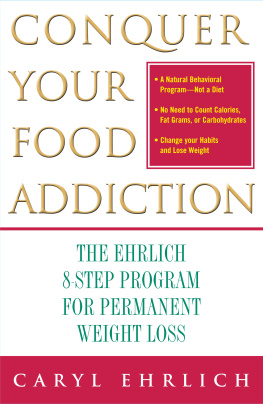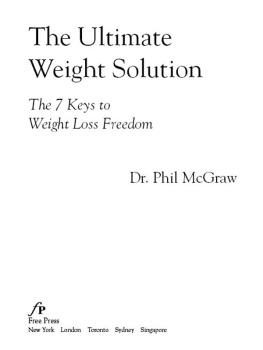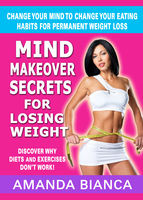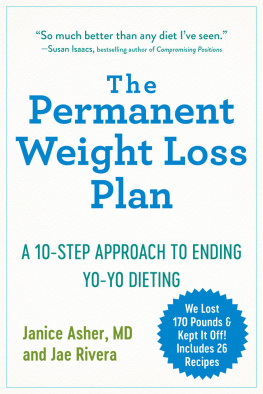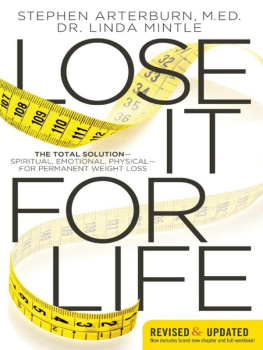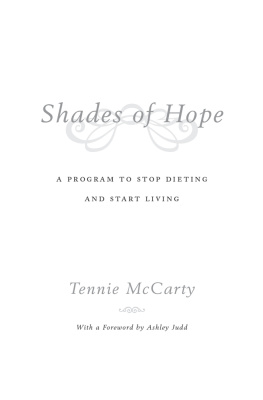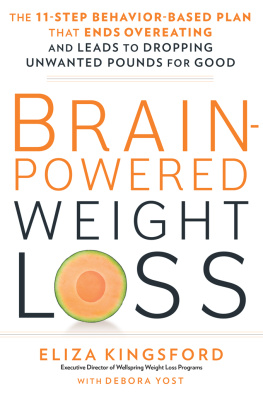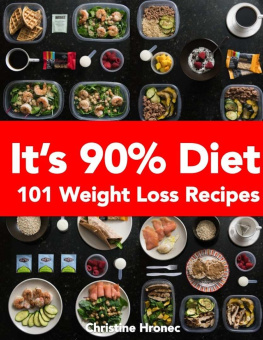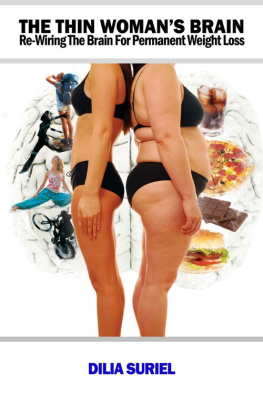CONQUER
YOUR
FOOD ADDICTION
The Ehrlich 8-Step Program
for Permanent Weight Loss
Caryl Ehrlich
FREE PRESS
New York London Toronto Sydney Singapore

FREE PRESS
A Division of Simon & Schuster
1230 Avenue of the Americas
New York, NY 10020
www.SimonandSchuster.com
Copyright 2002 by Caryl Ehrlich
All rights reserved,
including the right of reproduction
in whole or in part in any form.
First Free Press trade paperback edition 2003
FREE PRESS and colophon are trademarks
of Simon & Schuster, Inc.
For information about special discounts for bulk purchases,
please contact Simon & Schuster Special Sales:
1-800-456-6798 or business@simonandschuster.com
Designed by Jan Pisciotta
Illustrations on pages 19, 38, 61, 159, 185,
194, 214, 247, and 248 by Ron Porcelli; copyright Caryl Ehrlich.
Charts by Carolyn Nakano.
Manufactured in the United States of America
1 3 5 7 9 10 8 6 4 2
The Library of Congress has catalogued the Free Press
hardcover edition as follows:
Ehrlich, Caryl.
Conquer your food addiction : the Ehrlich 8-step program
for permanent weight loss / Caryl Ehrlich.
p. cm.
Includes index.
1. Weight lossPsychological aspects.
2. Compulsive eating.
3. Food habits.
I. Title.
RM222.2.E335 2002
616.8526dc21 2002019562
ISBN 0-7432-2974-6
eISBN-13: 978-1-4391-3552-5
ISBN-13: 978-0-7432-3282-1
0-7432-3282-8(Pbk)
The book is not intended to replace medical advice or to be a substitute for a physician. Always seek the advice of a physician before beginning any weight loss or exercise program. The author and publisher specifically disclaim any and all liability arising from the use of any information contained in this book. If you are under a physicians care for any condition, he or she can advise you about information described in this book.
I dedicate this book to all whove tried
to conquer the cycle of their food addiction.
William Ira BentonEditor, Harvard Medical Health Letter
Pleasure is not a necessary component of addiction. More plausible is the hypothesis that the addictive element of this behavior is not food, but the cycle itself.
Contents
Dear Reader
This is not a diet book. There are no recipes, no counting of calories or figuring of fat grams. There is no prop or pill, nor is there any diet or deprivation. There is no special food and no liquid concoction to mix. Conquer Your Food Addiction is a behavioral approach to weight loss. It is about learning to eat real food in the real world, but its not even about food. Its about conquering your inappropriate use of food.
The weight-weary might be thinking, But I know what to do. And you might. But if you dont know how to do it, you know nothing.
Every opinion, thought, and conclusion about weight loss in this book is my own, gained not only from keeping off 50 pounds for more than a quarter century, but also from successfully teaching my program to thousands of others.
Compulsive overeating is a full-blown addiction because you continue doing what youre doing even though there are negative consequences, and you are in denial about what youre doing and how it contributes to your weight. Even consuming an entire package of TicTacs every day of the year is a weight gain of more than 7 pounds by years end.
If you swallowed it, you ate it, and it all adds up.
If its not water, its food.
Your ritualized eating behavior is most likely mindless, unconscious, thoughtless, and automatic. My goal is to lead you to mindfulness, consciousness, and thoughtfulness. Instead of thinking, Im not doing anything to contribute to my weight problem, you begin to think: Oh yes. I do that. Next time, I can do something else.
You dont change the foods you eat.
You change your habits instead.
Old trigger situations dont disappear. You will feel lonely, tired, bored, frustrated, and angry again. But its not a reason to eat. You can learn a new automatic response.
This book is designed to help you gently change your thoughts and actions in small, incremental steps from your old it-isnt-working way of thinking to a new can-do-it way of thinking. Let me hear an I can do it. And if you want to learn how it has helped other participants in The Program, you can find their verbatim comments throughout the book.
The Program Way
The Program everything I talk about in this book is The Programbegins with a question, one in which most people are interested. What can I eat? they ask. The answer is, Anything; you just cant eat it all in the same meal. The problem is that most people watching their weight are so used to limiting what they can or cannot eat based on the mass of misinformationill-informed, over-hyped weight-control messagesin the marketplace that they simply dont get enough variety or satisfaction from what they do eat. The Program shows you more interesting possibilities of how to enjoy what youre eating and still lose weight. Yes, butter on your baked potato is fine.
The more important dimension of this program concerns the inappropriate, ritualized use of food that youve created to distract yourself from feeling things you dont want to feel. It contains many components. Food is just one of them. The other parts are the behavioral ritual blanket youve woven to self-medicate, to zone out; the way your mood, situation, and circumstance dictate when, what, and how much youre going to eat. Before you know it, youre eating just because its there, or youre bored, or its the only thing you could find, or the stock market went down (or up). It doesnt matter. Youre weaving a ritual web of distraction (from feelings you dont want to feel). That web of distraction comprises the things you say ( I cant eat that; I cant stop once I start; I cant eat in that restaurant ), what you wear ( I only wear dark colors; I cant wear belts; I cant shop in that store; all the clothes in my closet are tight ), finding the right recipes ( This is fat free; this is sugar-free; this is taste free ).
Another part of your web of distraction might be how you buy and keep clothes youve never worn. Or discussing with friends every up and down of how good and bad you are with your weight-loss plan. Or avoiding going to the beach for fear of walking around in shorts or a bathing suit. When it comes to distracting ritual behavior, it is just as seductive as the smell of a cup of coffee, the texture of a roll, the flavor of a sirloin steak, the crunch of a baked potato. Your behavioral rituals evolved from your parents passing along to you their family rituals to which youve added some of your own: This is how I eat in a Chinese restaurant, an Italian restaurant, Sunday brunch, when I celebrate, when I grieve. These behaviors are familiar and comfortable.
As someone once observed, Its deadening pain by means of a more intense pain.
Yes. Some idiot might have cut you off on the turnpike. Or a friend hurt your feelings. Or one of your children was sent home from school and you had to leave work early, or youre lonely or tired or angry. No matter. Eating doesnt change the outcome of anything but your waistline and your self-esteem.
The mind is ruled by its most dominant thought. If you keep thinking, This is how and what I eat when Im depressed

